Contemporary Hotel and Tourism Issues in Hong Kong: Analysis Report
VerifiedAdded on 2023/04/23
|10
|3388
|172
Report
AI Summary
This report provides a detailed analysis of contemporary hotel and tourism issues in Hong Kong. It begins with an introduction highlighting the importance of diversifying tourism sources and enhancing visitor experiences. The report then delves into specific issues, including the potential of business travelers as a key market segment, the impact of transport developments like the Area Traffic Control System and Incident Management, and the evolution of accommodation development through unique perks and real-time damage control. The report also examines crisis and risk management, emphasizing cross-cultural management and natural resource sustainability, and explores the influence of social media on destination marketing and visitor experience development through interactive events and music concerts. The conclusion summarizes the key findings and suggests measures for the sustainable growth of Hong Kong's tourism sector. The report aims to assist tourism managers and government officials in ensuring a thriving future for the industry.
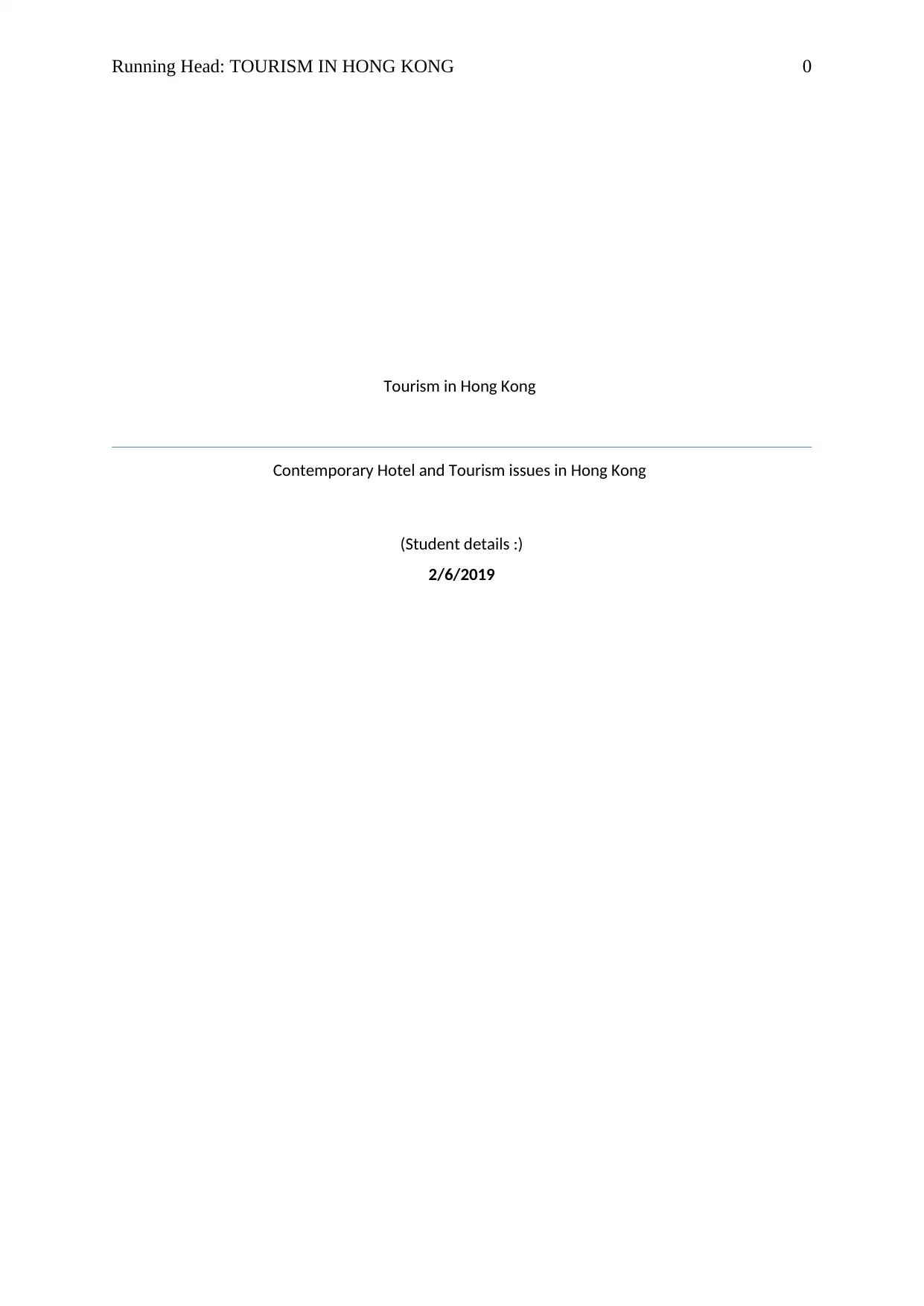
Running Head: TOURISM IN HONG KONG 0
Tourism in Hong Kong
Contemporary Hotel and Tourism issues in Hong Kong
(Student details :)
2/6/2019
Tourism in Hong Kong
Contemporary Hotel and Tourism issues in Hong Kong
(Student details :)
2/6/2019
Paraphrase This Document
Need a fresh take? Get an instant paraphrase of this document with our AI Paraphraser
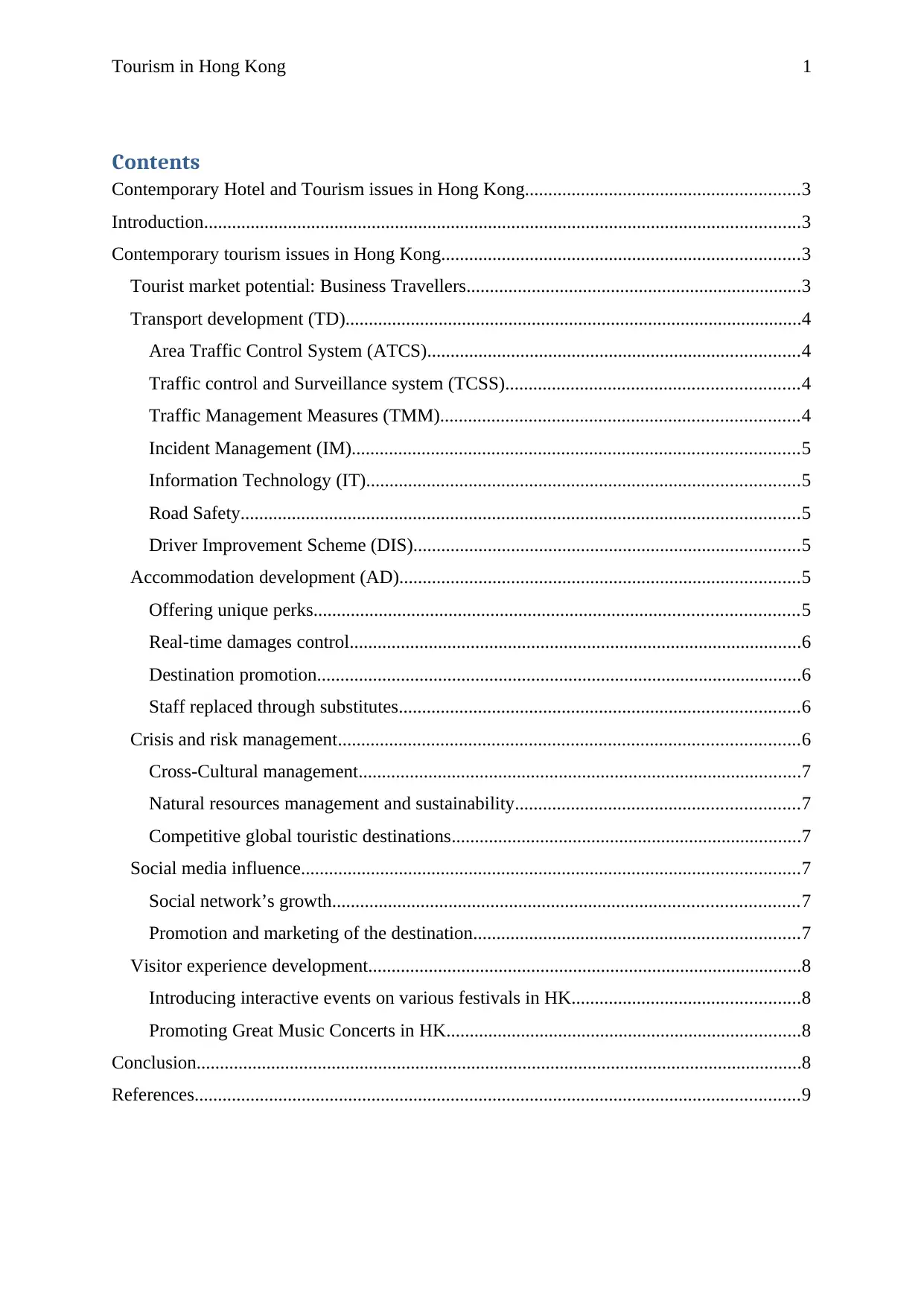
Tourism in Hong Kong 1
Contents
Contemporary Hotel and Tourism issues in Hong Kong...........................................................3
Introduction................................................................................................................................3
Contemporary tourism issues in Hong Kong.............................................................................3
Tourist market potential: Business Travellers........................................................................3
Transport development (TD)..................................................................................................4
Area Traffic Control System (ATCS)................................................................................4
Traffic control and Surveillance system (TCSS)...............................................................4
Traffic Management Measures (TMM).............................................................................4
Incident Management (IM)................................................................................................5
Information Technology (IT).............................................................................................5
Road Safety........................................................................................................................5
Driver Improvement Scheme (DIS)...................................................................................5
Accommodation development (AD)......................................................................................5
Offering unique perks........................................................................................................5
Real-time damages control.................................................................................................6
Destination promotion........................................................................................................6
Staff replaced through substitutes......................................................................................6
Crisis and risk management...................................................................................................6
Cross-Cultural management...............................................................................................7
Natural resources management and sustainability.............................................................7
Competitive global touristic destinations...........................................................................7
Social media influence...........................................................................................................7
Social network’s growth....................................................................................................7
Promotion and marketing of the destination......................................................................7
Visitor experience development.............................................................................................8
Introducing interactive events on various festivals in HK.................................................8
Promoting Great Music Concerts in HK............................................................................8
Conclusion..................................................................................................................................8
References..................................................................................................................................9
Contents
Contemporary Hotel and Tourism issues in Hong Kong...........................................................3
Introduction................................................................................................................................3
Contemporary tourism issues in Hong Kong.............................................................................3
Tourist market potential: Business Travellers........................................................................3
Transport development (TD)..................................................................................................4
Area Traffic Control System (ATCS)................................................................................4
Traffic control and Surveillance system (TCSS)...............................................................4
Traffic Management Measures (TMM).............................................................................4
Incident Management (IM)................................................................................................5
Information Technology (IT).............................................................................................5
Road Safety........................................................................................................................5
Driver Improvement Scheme (DIS)...................................................................................5
Accommodation development (AD)......................................................................................5
Offering unique perks........................................................................................................5
Real-time damages control.................................................................................................6
Destination promotion........................................................................................................6
Staff replaced through substitutes......................................................................................6
Crisis and risk management...................................................................................................6
Cross-Cultural management...............................................................................................7
Natural resources management and sustainability.............................................................7
Competitive global touristic destinations...........................................................................7
Social media influence...........................................................................................................7
Social network’s growth....................................................................................................7
Promotion and marketing of the destination......................................................................7
Visitor experience development.............................................................................................8
Introducing interactive events on various festivals in HK.................................................8
Promoting Great Music Concerts in HK............................................................................8
Conclusion..................................................................................................................................8
References..................................................................................................................................9
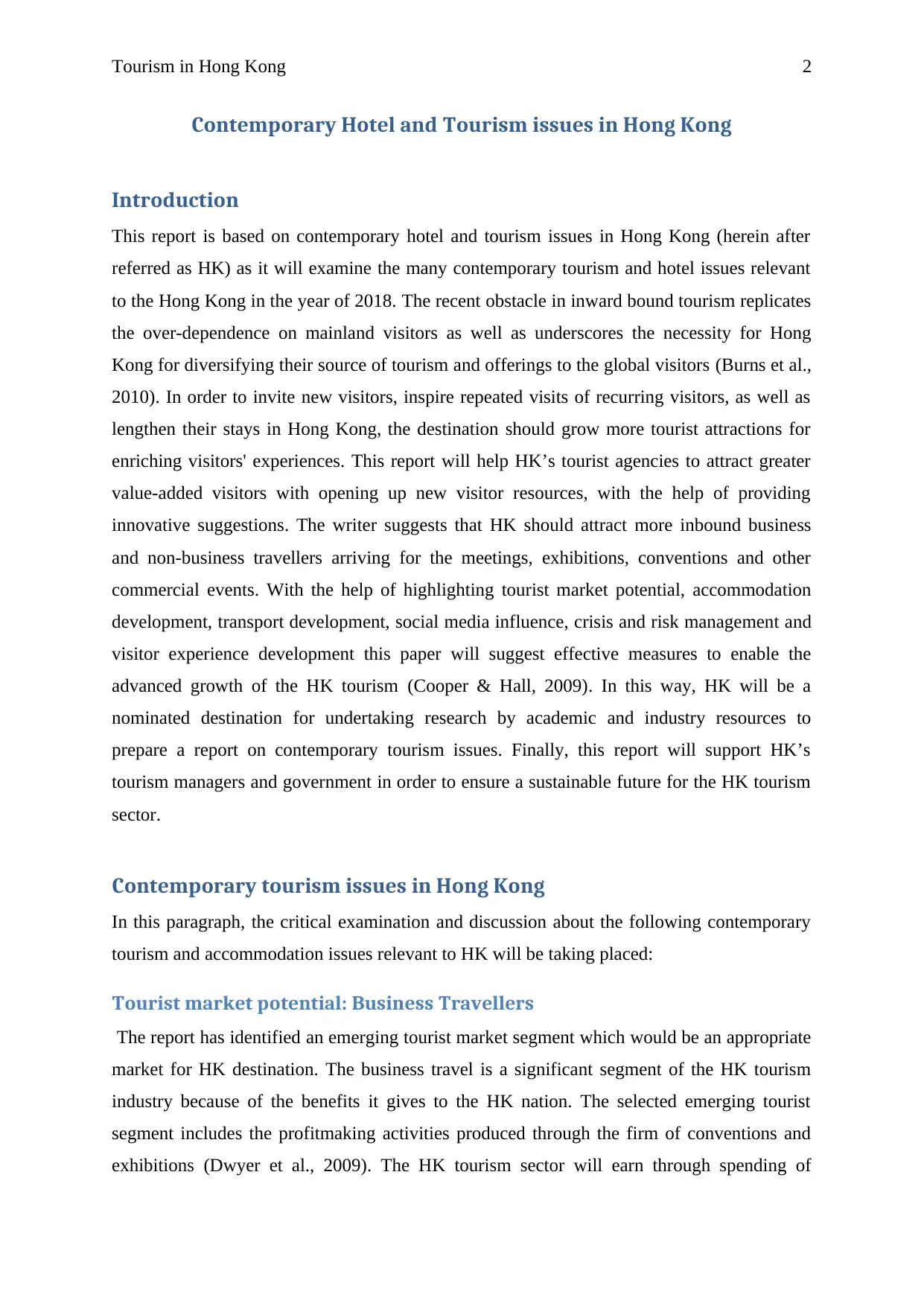
Tourism in Hong Kong 2
Contemporary Hotel and Tourism issues in Hong Kong
Introduction
This report is based on contemporary hotel and tourism issues in Hong Kong (herein after
referred as HK) as it will examine the many contemporary tourism and hotel issues relevant
to the Hong Kong in the year of 2018. The recent obstacle in inward bound tourism replicates
the over-dependence on mainland visitors as well as underscores the necessity for Hong
Kong for diversifying their source of tourism and offerings to the global visitors (Burns et al.,
2010). In order to invite new visitors, inspire repeated visits of recurring visitors, as well as
lengthen their stays in Hong Kong, the destination should grow more tourist attractions for
enriching visitors' experiences. This report will help HK’s tourist agencies to attract greater
value-added visitors with opening up new visitor resources, with the help of providing
innovative suggestions. The writer suggests that HK should attract more inbound business
and non-business travellers arriving for the meetings, exhibitions, conventions and other
commercial events. With the help of highlighting tourist market potential, accommodation
development, transport development, social media influence, crisis and risk management and
visitor experience development this paper will suggest effective measures to enable the
advanced growth of the HK tourism (Cooper & Hall, 2009). In this way, HK will be a
nominated destination for undertaking research by academic and industry resources to
prepare a report on contemporary tourism issues. Finally, this report will support HK’s
tourism managers and government in order to ensure a sustainable future for the HK tourism
sector.
Contemporary tourism issues in Hong Kong
In this paragraph, the critical examination and discussion about the following contemporary
tourism and accommodation issues relevant to HK will be taking placed:
Tourist market potential: Business Travellers
The report has identified an emerging tourist market segment which would be an appropriate
market for HK destination. The business travel is a significant segment of the HK tourism
industry because of the benefits it gives to the HK nation. The selected emerging tourist
segment includes the profitmaking activities produced through the firm of conventions and
exhibitions (Dwyer et al., 2009). The HK tourism sector will earn through spending of
Contemporary Hotel and Tourism issues in Hong Kong
Introduction
This report is based on contemporary hotel and tourism issues in Hong Kong (herein after
referred as HK) as it will examine the many contemporary tourism and hotel issues relevant
to the Hong Kong in the year of 2018. The recent obstacle in inward bound tourism replicates
the over-dependence on mainland visitors as well as underscores the necessity for Hong
Kong for diversifying their source of tourism and offerings to the global visitors (Burns et al.,
2010). In order to invite new visitors, inspire repeated visits of recurring visitors, as well as
lengthen their stays in Hong Kong, the destination should grow more tourist attractions for
enriching visitors' experiences. This report will help HK’s tourist agencies to attract greater
value-added visitors with opening up new visitor resources, with the help of providing
innovative suggestions. The writer suggests that HK should attract more inbound business
and non-business travellers arriving for the meetings, exhibitions, conventions and other
commercial events. With the help of highlighting tourist market potential, accommodation
development, transport development, social media influence, crisis and risk management and
visitor experience development this paper will suggest effective measures to enable the
advanced growth of the HK tourism (Cooper & Hall, 2009). In this way, HK will be a
nominated destination for undertaking research by academic and industry resources to
prepare a report on contemporary tourism issues. Finally, this report will support HK’s
tourism managers and government in order to ensure a sustainable future for the HK tourism
sector.
Contemporary tourism issues in Hong Kong
In this paragraph, the critical examination and discussion about the following contemporary
tourism and accommodation issues relevant to HK will be taking placed:
Tourist market potential: Business Travellers
The report has identified an emerging tourist market segment which would be an appropriate
market for HK destination. The business travel is a significant segment of the HK tourism
industry because of the benefits it gives to the HK nation. The selected emerging tourist
segment includes the profitmaking activities produced through the firm of conventions and
exhibitions (Dwyer et al., 2009). The HK tourism sector will earn through spending of
⊘ This is a preview!⊘
Do you want full access?
Subscribe today to unlock all pages.

Trusted by 1+ million students worldwide
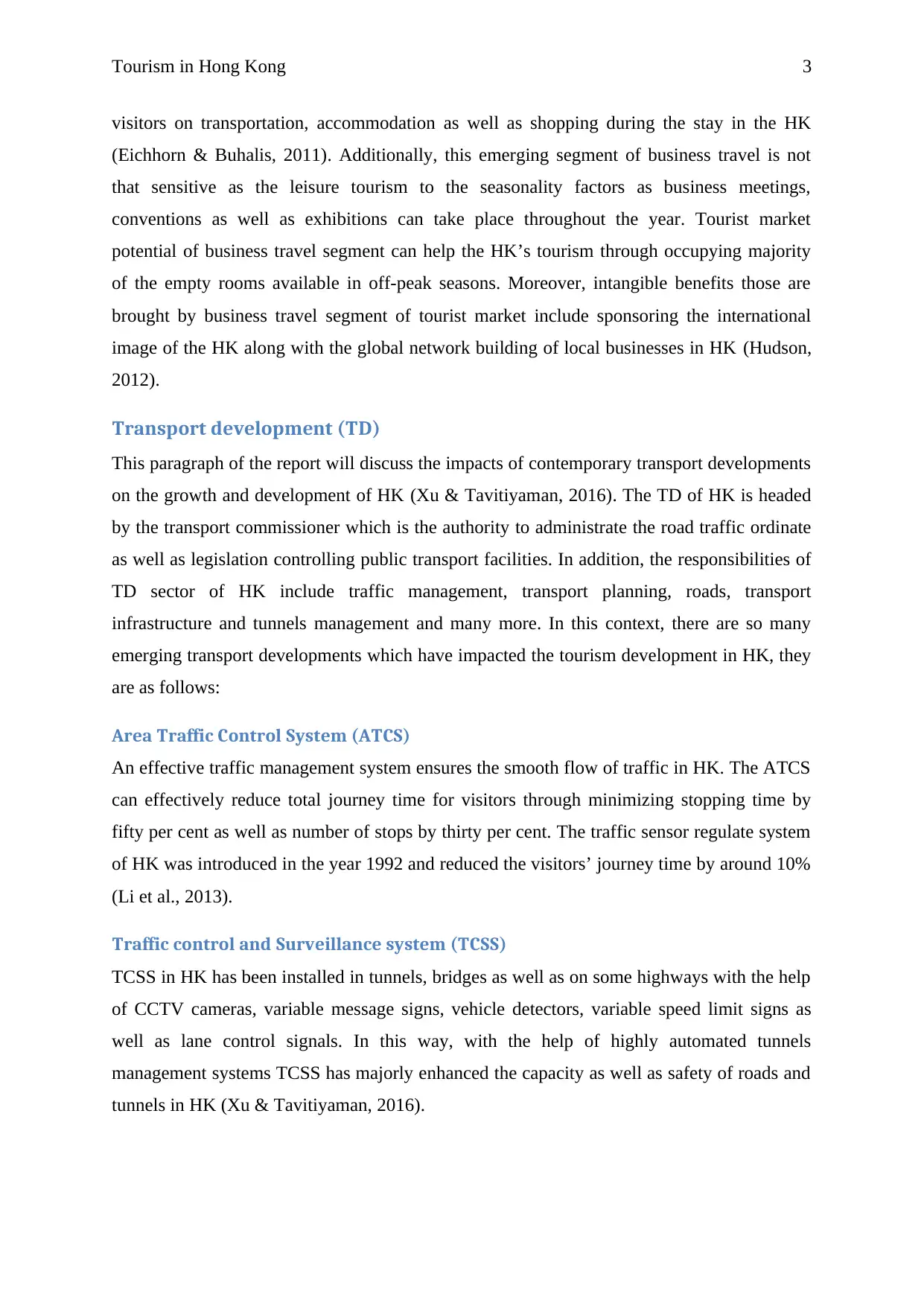
Tourism in Hong Kong 3
visitors on transportation, accommodation as well as shopping during the stay in the HK
(Eichhorn & Buhalis, 2011). Additionally, this emerging segment of business travel is not
that sensitive as the leisure tourism to the seasonality factors as business meetings,
conventions as well as exhibitions can take place throughout the year. Tourist market
potential of business travel segment can help the HK’s tourism through occupying majority
of the empty rooms available in off-peak seasons. Moreover, intangible benefits those are
brought by business travel segment of tourist market include sponsoring the international
image of the HK along with the global network building of local businesses in HK (Hudson,
2012).
Transport development (TD)
This paragraph of the report will discuss the impacts of contemporary transport developments
on the growth and development of HK (Xu & Tavitiyaman, 2016). The TD of HK is headed
by the transport commissioner which is the authority to administrate the road traffic ordinate
as well as legislation controlling public transport facilities. In addition, the responsibilities of
TD sector of HK include traffic management, transport planning, roads, transport
infrastructure and tunnels management and many more. In this context, there are so many
emerging transport developments which have impacted the tourism development in HK, they
are as follows:
Area Traffic Control System (ATCS)
An effective traffic management system ensures the smooth flow of traffic in HK. The ATCS
can effectively reduce total journey time for visitors through minimizing stopping time by
fifty per cent as well as number of stops by thirty per cent. The traffic sensor regulate system
of HK was introduced in the year 1992 and reduced the visitors’ journey time by around 10%
(Li et al., 2013).
Traffic control and Surveillance system (TCSS)
TCSS in HK has been installed in tunnels, bridges as well as on some highways with the help
of CCTV cameras, variable message signs, vehicle detectors, variable speed limit signs as
well as lane control signals. In this way, with the help of highly automated tunnels
management systems TCSS has majorly enhanced the capacity as well as safety of roads and
tunnels in HK (Xu & Tavitiyaman, 2016).
visitors on transportation, accommodation as well as shopping during the stay in the HK
(Eichhorn & Buhalis, 2011). Additionally, this emerging segment of business travel is not
that sensitive as the leisure tourism to the seasonality factors as business meetings,
conventions as well as exhibitions can take place throughout the year. Tourist market
potential of business travel segment can help the HK’s tourism through occupying majority
of the empty rooms available in off-peak seasons. Moreover, intangible benefits those are
brought by business travel segment of tourist market include sponsoring the international
image of the HK along with the global network building of local businesses in HK (Hudson,
2012).
Transport development (TD)
This paragraph of the report will discuss the impacts of contemporary transport developments
on the growth and development of HK (Xu & Tavitiyaman, 2016). The TD of HK is headed
by the transport commissioner which is the authority to administrate the road traffic ordinate
as well as legislation controlling public transport facilities. In addition, the responsibilities of
TD sector of HK include traffic management, transport planning, roads, transport
infrastructure and tunnels management and many more. In this context, there are so many
emerging transport developments which have impacted the tourism development in HK, they
are as follows:
Area Traffic Control System (ATCS)
An effective traffic management system ensures the smooth flow of traffic in HK. The ATCS
can effectively reduce total journey time for visitors through minimizing stopping time by
fifty per cent as well as number of stops by thirty per cent. The traffic sensor regulate system
of HK was introduced in the year 1992 and reduced the visitors’ journey time by around 10%
(Li et al., 2013).
Traffic control and Surveillance system (TCSS)
TCSS in HK has been installed in tunnels, bridges as well as on some highways with the help
of CCTV cameras, variable message signs, vehicle detectors, variable speed limit signs as
well as lane control signals. In this way, with the help of highly automated tunnels
management systems TCSS has majorly enhanced the capacity as well as safety of roads and
tunnels in HK (Xu & Tavitiyaman, 2016).
Paraphrase This Document
Need a fresh take? Get an instant paraphrase of this document with our AI Paraphraser
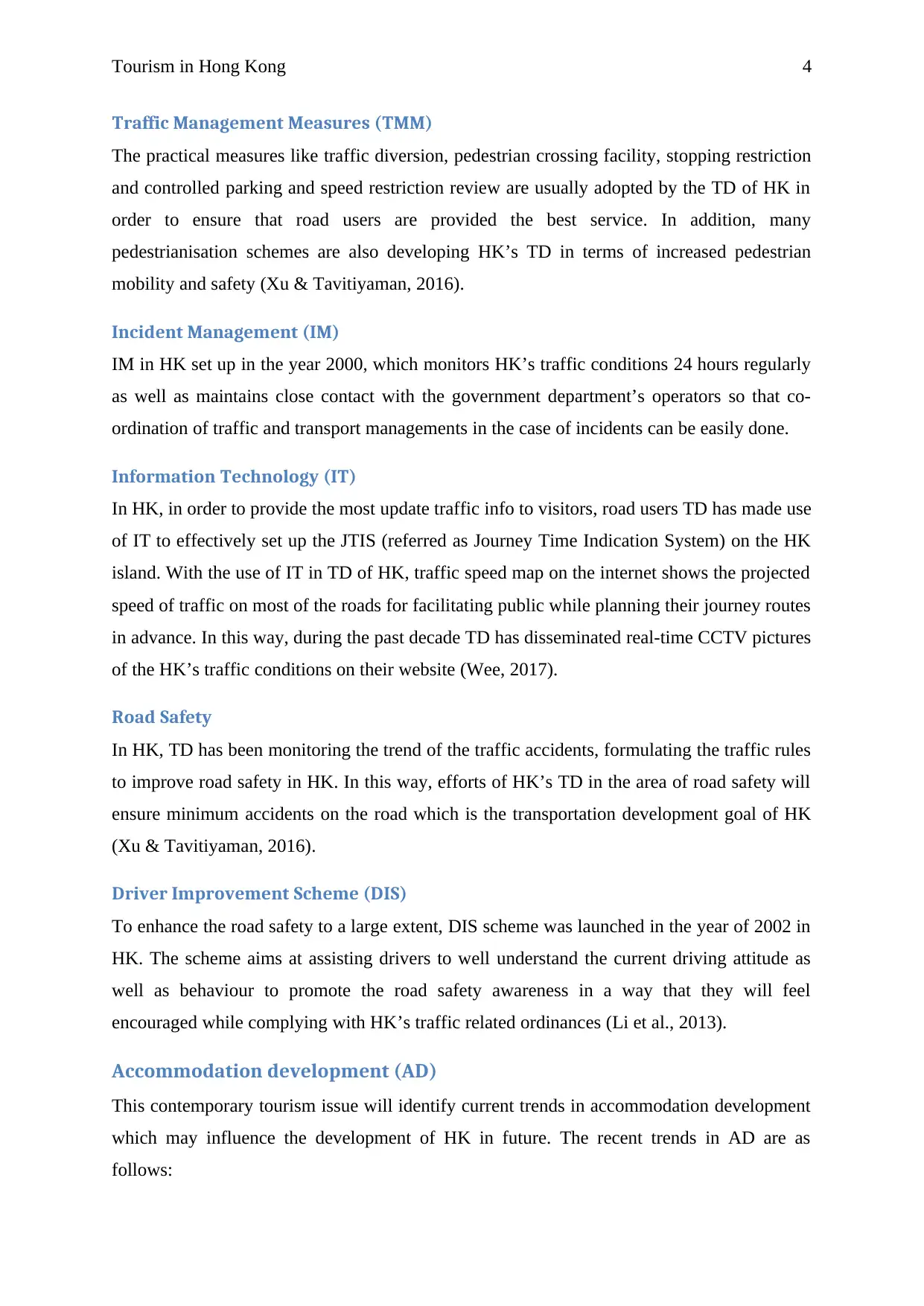
Tourism in Hong Kong 4
Traffic Management Measures (TMM)
The practical measures like traffic diversion, pedestrian crossing facility, stopping restriction
and controlled parking and speed restriction review are usually adopted by the TD of HK in
order to ensure that road users are provided the best service. In addition, many
pedestrianisation schemes are also developing HK’s TD in terms of increased pedestrian
mobility and safety (Xu & Tavitiyaman, 2016).
Incident Management (IM)
IM in HK set up in the year 2000, which monitors HK’s traffic conditions 24 hours regularly
as well as maintains close contact with the government department’s operators so that co-
ordination of traffic and transport managements in the case of incidents can be easily done.
Information Technology (IT)
In HK, in order to provide the most update traffic info to visitors, road users TD has made use
of IT to effectively set up the JTIS (referred as Journey Time Indication System) on the HK
island. With the use of IT in TD of HK, traffic speed map on the internet shows the projected
speed of traffic on most of the roads for facilitating public while planning their journey routes
in advance. In this way, during the past decade TD has disseminated real-time CCTV pictures
of the HK’s traffic conditions on their website (Wee, 2017).
Road Safety
In HK, TD has been monitoring the trend of the traffic accidents, formulating the traffic rules
to improve road safety in HK. In this way, efforts of HK’s TD in the area of road safety will
ensure minimum accidents on the road which is the transportation development goal of HK
(Xu & Tavitiyaman, 2016).
Driver Improvement Scheme (DIS)
To enhance the road safety to a large extent, DIS scheme was launched in the year of 2002 in
HK. The scheme aims at assisting drivers to well understand the current driving attitude as
well as behaviour to promote the road safety awareness in a way that they will feel
encouraged while complying with HK’s traffic related ordinances (Li et al., 2013).
Accommodation development (AD)
This contemporary tourism issue will identify current trends in accommodation development
which may influence the development of HK in future. The recent trends in AD are as
follows:
Traffic Management Measures (TMM)
The practical measures like traffic diversion, pedestrian crossing facility, stopping restriction
and controlled parking and speed restriction review are usually adopted by the TD of HK in
order to ensure that road users are provided the best service. In addition, many
pedestrianisation schemes are also developing HK’s TD in terms of increased pedestrian
mobility and safety (Xu & Tavitiyaman, 2016).
Incident Management (IM)
IM in HK set up in the year 2000, which monitors HK’s traffic conditions 24 hours regularly
as well as maintains close contact with the government department’s operators so that co-
ordination of traffic and transport managements in the case of incidents can be easily done.
Information Technology (IT)
In HK, in order to provide the most update traffic info to visitors, road users TD has made use
of IT to effectively set up the JTIS (referred as Journey Time Indication System) on the HK
island. With the use of IT in TD of HK, traffic speed map on the internet shows the projected
speed of traffic on most of the roads for facilitating public while planning their journey routes
in advance. In this way, during the past decade TD has disseminated real-time CCTV pictures
of the HK’s traffic conditions on their website (Wee, 2017).
Road Safety
In HK, TD has been monitoring the trend of the traffic accidents, formulating the traffic rules
to improve road safety in HK. In this way, efforts of HK’s TD in the area of road safety will
ensure minimum accidents on the road which is the transportation development goal of HK
(Xu & Tavitiyaman, 2016).
Driver Improvement Scheme (DIS)
To enhance the road safety to a large extent, DIS scheme was launched in the year of 2002 in
HK. The scheme aims at assisting drivers to well understand the current driving attitude as
well as behaviour to promote the road safety awareness in a way that they will feel
encouraged while complying with HK’s traffic related ordinances (Li et al., 2013).
Accommodation development (AD)
This contemporary tourism issue will identify current trends in accommodation development
which may influence the development of HK in future. The recent trends in AD are as
follows:
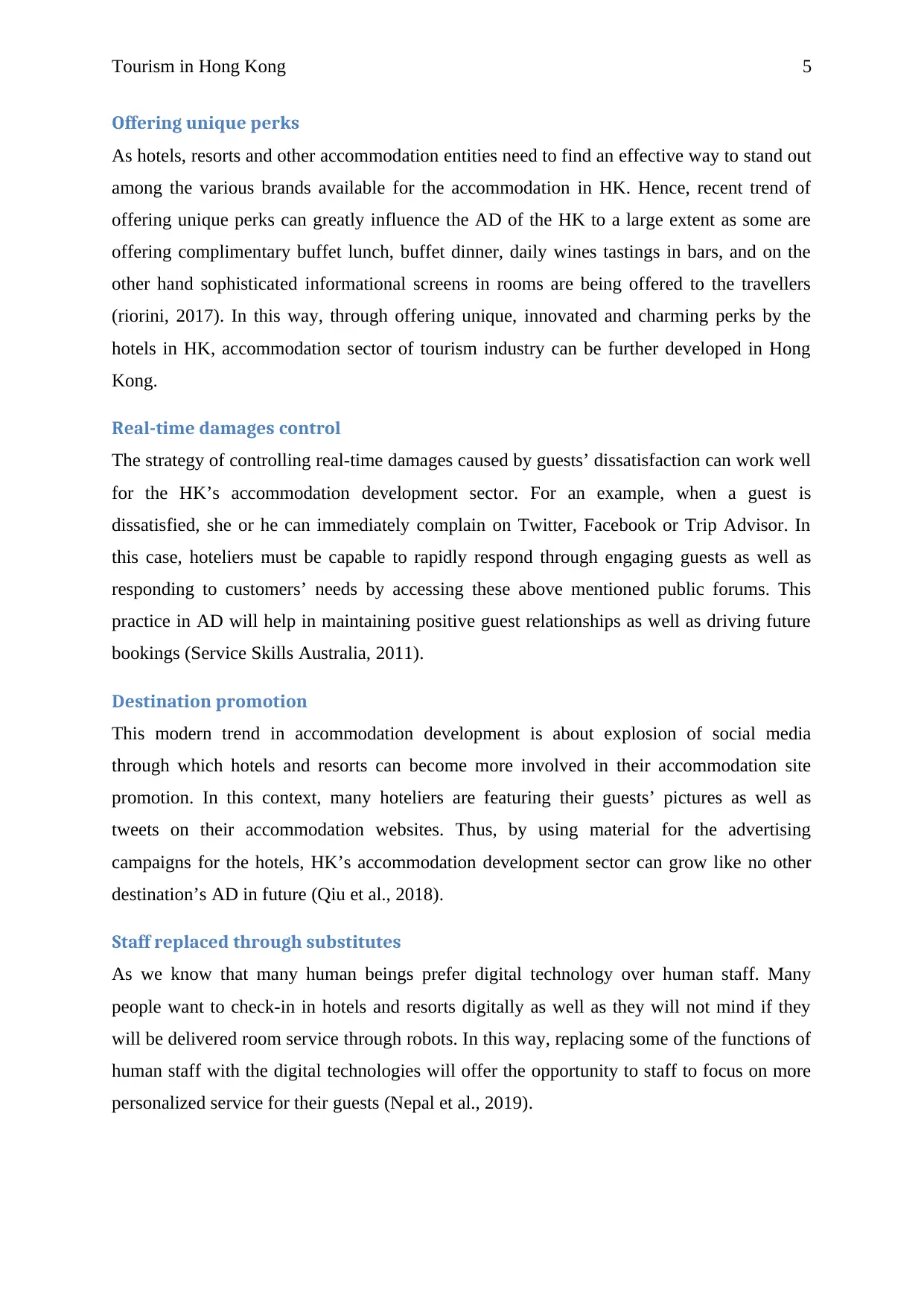
Tourism in Hong Kong 5
Offering unique perks
As hotels, resorts and other accommodation entities need to find an effective way to stand out
among the various brands available for the accommodation in HK. Hence, recent trend of
offering unique perks can greatly influence the AD of the HK to a large extent as some are
offering complimentary buffet lunch, buffet dinner, daily wines tastings in bars, and on the
other hand sophisticated informational screens in rooms are being offered to the travellers
(riorini, 2017). In this way, through offering unique, innovated and charming perks by the
hotels in HK, accommodation sector of tourism industry can be further developed in Hong
Kong.
Real-time damages control
The strategy of controlling real-time damages caused by guests’ dissatisfaction can work well
for the HK’s accommodation development sector. For an example, when a guest is
dissatisfied, she or he can immediately complain on Twitter, Facebook or Trip Advisor. In
this case, hoteliers must be capable to rapidly respond through engaging guests as well as
responding to customers’ needs by accessing these above mentioned public forums. This
practice in AD will help in maintaining positive guest relationships as well as driving future
bookings (Service Skills Australia, 2011).
Destination promotion
This modern trend in accommodation development is about explosion of social media
through which hotels and resorts can become more involved in their accommodation site
promotion. In this context, many hoteliers are featuring their guests’ pictures as well as
tweets on their accommodation websites. Thus, by using material for the advertising
campaigns for the hotels, HK’s accommodation development sector can grow like no other
destination’s AD in future (Qiu et al., 2018).
Staff replaced through substitutes
As we know that many human beings prefer digital technology over human staff. Many
people want to check-in in hotels and resorts digitally as well as they will not mind if they
will be delivered room service through robots. In this way, replacing some of the functions of
human staff with the digital technologies will offer the opportunity to staff to focus on more
personalized service for their guests (Nepal et al., 2019).
Offering unique perks
As hotels, resorts and other accommodation entities need to find an effective way to stand out
among the various brands available for the accommodation in HK. Hence, recent trend of
offering unique perks can greatly influence the AD of the HK to a large extent as some are
offering complimentary buffet lunch, buffet dinner, daily wines tastings in bars, and on the
other hand sophisticated informational screens in rooms are being offered to the travellers
(riorini, 2017). In this way, through offering unique, innovated and charming perks by the
hotels in HK, accommodation sector of tourism industry can be further developed in Hong
Kong.
Real-time damages control
The strategy of controlling real-time damages caused by guests’ dissatisfaction can work well
for the HK’s accommodation development sector. For an example, when a guest is
dissatisfied, she or he can immediately complain on Twitter, Facebook or Trip Advisor. In
this case, hoteliers must be capable to rapidly respond through engaging guests as well as
responding to customers’ needs by accessing these above mentioned public forums. This
practice in AD will help in maintaining positive guest relationships as well as driving future
bookings (Service Skills Australia, 2011).
Destination promotion
This modern trend in accommodation development is about explosion of social media
through which hotels and resorts can become more involved in their accommodation site
promotion. In this context, many hoteliers are featuring their guests’ pictures as well as
tweets on their accommodation websites. Thus, by using material for the advertising
campaigns for the hotels, HK’s accommodation development sector can grow like no other
destination’s AD in future (Qiu et al., 2018).
Staff replaced through substitutes
As we know that many human beings prefer digital technology over human staff. Many
people want to check-in in hotels and resorts digitally as well as they will not mind if they
will be delivered room service through robots. In this way, replacing some of the functions of
human staff with the digital technologies will offer the opportunity to staff to focus on more
personalized service for their guests (Nepal et al., 2019).
⊘ This is a preview!⊘
Do you want full access?
Subscribe today to unlock all pages.

Trusted by 1+ million students worldwide
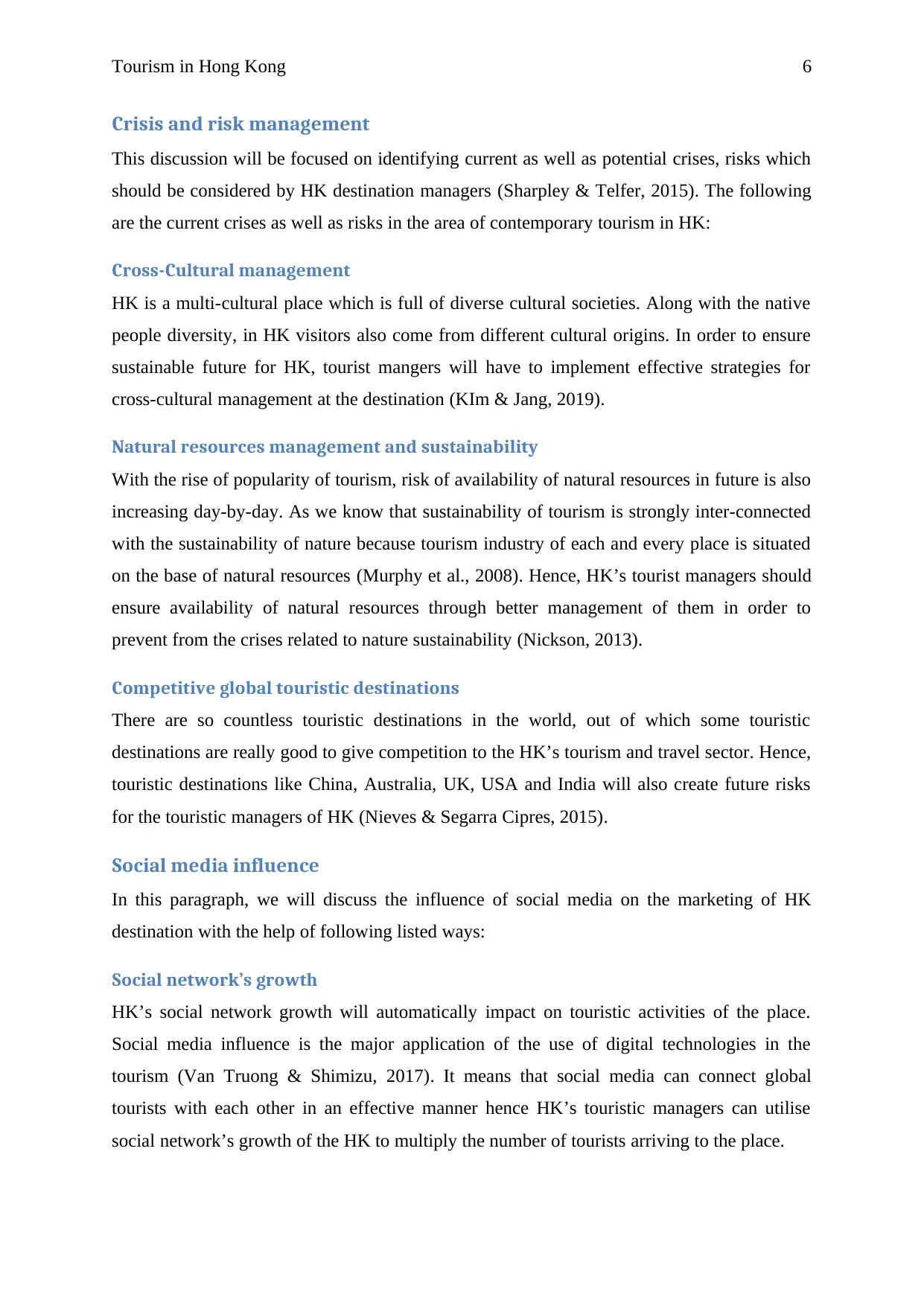
Tourism in Hong Kong 6
Crisis and risk management
This discussion will be focused on identifying current as well as potential crises, risks which
should be considered by HK destination managers (Sharpley & Telfer, 2015). The following
are the current crises as well as risks in the area of contemporary tourism in HK:
Cross-Cultural management
HK is a multi-cultural place which is full of diverse cultural societies. Along with the native
people diversity, in HK visitors also come from different cultural origins. In order to ensure
sustainable future for HK, tourist mangers will have to implement effective strategies for
cross-cultural management at the destination (KIm & Jang, 2019).
Natural resources management and sustainability
With the rise of popularity of tourism, risk of availability of natural resources in future is also
increasing day-by-day. As we know that sustainability of tourism is strongly inter-connected
with the sustainability of nature because tourism industry of each and every place is situated
on the base of natural resources (Murphy et al., 2008). Hence, HK’s tourist managers should
ensure availability of natural resources through better management of them in order to
prevent from the crises related to nature sustainability (Nickson, 2013).
Competitive global touristic destinations
There are so countless touristic destinations in the world, out of which some touristic
destinations are really good to give competition to the HK’s tourism and travel sector. Hence,
touristic destinations like China, Australia, UK, USA and India will also create future risks
for the touristic managers of HK (Nieves & Segarra Cipres, 2015).
Social media influence
In this paragraph, we will discuss the influence of social media on the marketing of HK
destination with the help of following listed ways:
Social network’s growth
HK’s social network growth will automatically impact on touristic activities of the place.
Social media influence is the major application of the use of digital technologies in the
tourism (Van Truong & Shimizu, 2017). It means that social media can connect global
tourists with each other in an effective manner hence HK’s touristic managers can utilise
social network’s growth of the HK to multiply the number of tourists arriving to the place.
Crisis and risk management
This discussion will be focused on identifying current as well as potential crises, risks which
should be considered by HK destination managers (Sharpley & Telfer, 2015). The following
are the current crises as well as risks in the area of contemporary tourism in HK:
Cross-Cultural management
HK is a multi-cultural place which is full of diverse cultural societies. Along with the native
people diversity, in HK visitors also come from different cultural origins. In order to ensure
sustainable future for HK, tourist mangers will have to implement effective strategies for
cross-cultural management at the destination (KIm & Jang, 2019).
Natural resources management and sustainability
With the rise of popularity of tourism, risk of availability of natural resources in future is also
increasing day-by-day. As we know that sustainability of tourism is strongly inter-connected
with the sustainability of nature because tourism industry of each and every place is situated
on the base of natural resources (Murphy et al., 2008). Hence, HK’s tourist managers should
ensure availability of natural resources through better management of them in order to
prevent from the crises related to nature sustainability (Nickson, 2013).
Competitive global touristic destinations
There are so countless touristic destinations in the world, out of which some touristic
destinations are really good to give competition to the HK’s tourism and travel sector. Hence,
touristic destinations like China, Australia, UK, USA and India will also create future risks
for the touristic managers of HK (Nieves & Segarra Cipres, 2015).
Social media influence
In this paragraph, we will discuss the influence of social media on the marketing of HK
destination with the help of following listed ways:
Social network’s growth
HK’s social network growth will automatically impact on touristic activities of the place.
Social media influence is the major application of the use of digital technologies in the
tourism (Van Truong & Shimizu, 2017). It means that social media can connect global
tourists with each other in an effective manner hence HK’s touristic managers can utilise
social network’s growth of the HK to multiply the number of tourists arriving to the place.
Paraphrase This Document
Need a fresh take? Get an instant paraphrase of this document with our AI Paraphraser
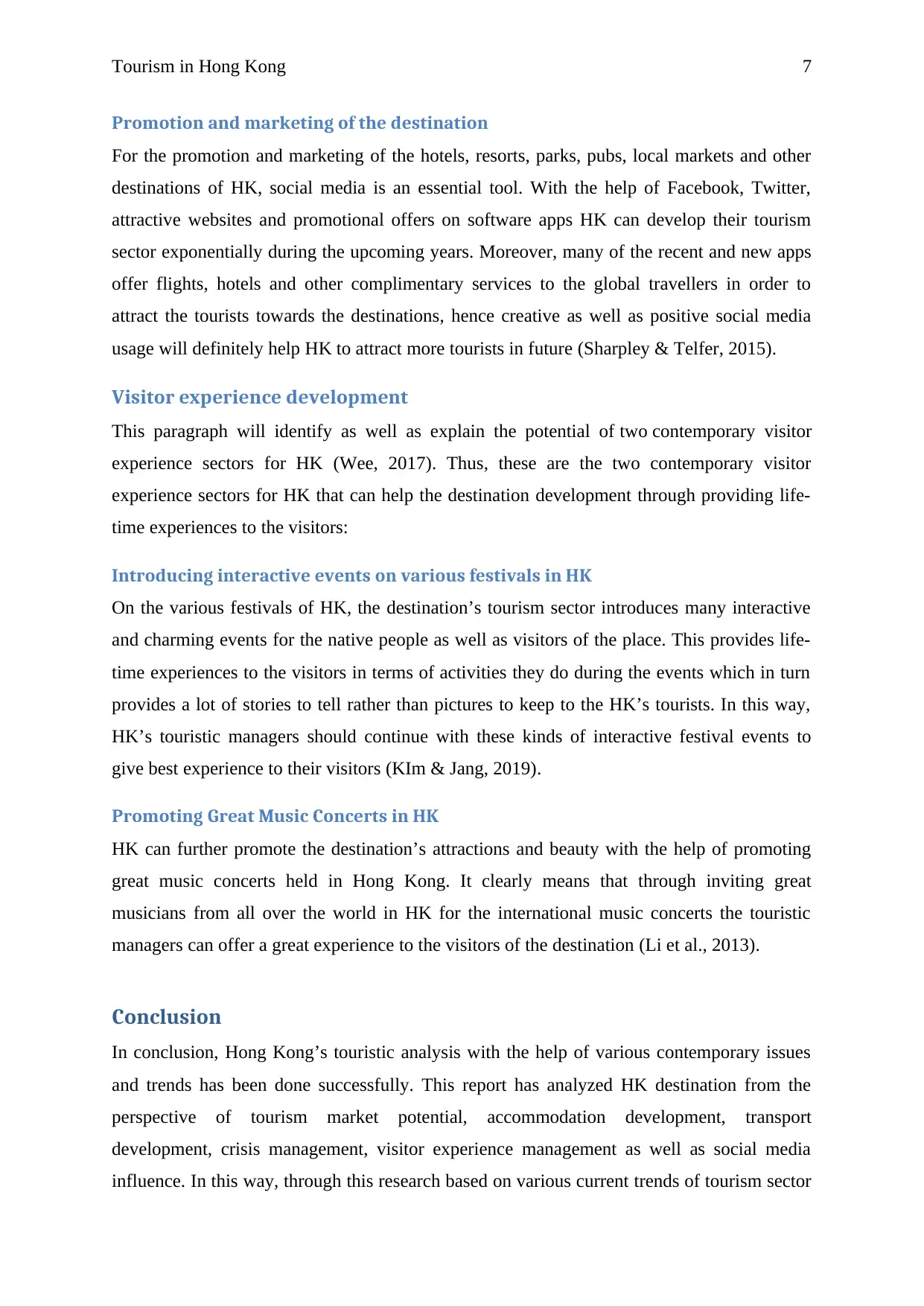
Tourism in Hong Kong 7
Promotion and marketing of the destination
For the promotion and marketing of the hotels, resorts, parks, pubs, local markets and other
destinations of HK, social media is an essential tool. With the help of Facebook, Twitter,
attractive websites and promotional offers on software apps HK can develop their tourism
sector exponentially during the upcoming years. Moreover, many of the recent and new apps
offer flights, hotels and other complimentary services to the global travellers in order to
attract the tourists towards the destinations, hence creative as well as positive social media
usage will definitely help HK to attract more tourists in future (Sharpley & Telfer, 2015).
Visitor experience development
This paragraph will identify as well as explain the potential of two contemporary visitor
experience sectors for HK (Wee, 2017). Thus, these are the two contemporary visitor
experience sectors for HK that can help the destination development through providing life-
time experiences to the visitors:
Introducing interactive events on various festivals in HK
On the various festivals of HK, the destination’s tourism sector introduces many interactive
and charming events for the native people as well as visitors of the place. This provides life-
time experiences to the visitors in terms of activities they do during the events which in turn
provides a lot of stories to tell rather than pictures to keep to the HK’s tourists. In this way,
HK’s touristic managers should continue with these kinds of interactive festival events to
give best experience to their visitors (KIm & Jang, 2019).
Promoting Great Music Concerts in HK
HK can further promote the destination’s attractions and beauty with the help of promoting
great music concerts held in Hong Kong. It clearly means that through inviting great
musicians from all over the world in HK for the international music concerts the touristic
managers can offer a great experience to the visitors of the destination (Li et al., 2013).
Conclusion
In conclusion, Hong Kong’s touristic analysis with the help of various contemporary issues
and trends has been done successfully. This report has analyzed HK destination from the
perspective of tourism market potential, accommodation development, transport
development, crisis management, visitor experience management as well as social media
influence. In this way, through this research based on various current trends of tourism sector
Promotion and marketing of the destination
For the promotion and marketing of the hotels, resorts, parks, pubs, local markets and other
destinations of HK, social media is an essential tool. With the help of Facebook, Twitter,
attractive websites and promotional offers on software apps HK can develop their tourism
sector exponentially during the upcoming years. Moreover, many of the recent and new apps
offer flights, hotels and other complimentary services to the global travellers in order to
attract the tourists towards the destinations, hence creative as well as positive social media
usage will definitely help HK to attract more tourists in future (Sharpley & Telfer, 2015).
Visitor experience development
This paragraph will identify as well as explain the potential of two contemporary visitor
experience sectors for HK (Wee, 2017). Thus, these are the two contemporary visitor
experience sectors for HK that can help the destination development through providing life-
time experiences to the visitors:
Introducing interactive events on various festivals in HK
On the various festivals of HK, the destination’s tourism sector introduces many interactive
and charming events for the native people as well as visitors of the place. This provides life-
time experiences to the visitors in terms of activities they do during the events which in turn
provides a lot of stories to tell rather than pictures to keep to the HK’s tourists. In this way,
HK’s touristic managers should continue with these kinds of interactive festival events to
give best experience to their visitors (KIm & Jang, 2019).
Promoting Great Music Concerts in HK
HK can further promote the destination’s attractions and beauty with the help of promoting
great music concerts held in Hong Kong. It clearly means that through inviting great
musicians from all over the world in HK for the international music concerts the touristic
managers can offer a great experience to the visitors of the destination (Li et al., 2013).
Conclusion
In conclusion, Hong Kong’s touristic analysis with the help of various contemporary issues
and trends has been done successfully. This report has analyzed HK destination from the
perspective of tourism market potential, accommodation development, transport
development, crisis management, visitor experience management as well as social media
influence. In this way, through this research based on various current trends of tourism sector
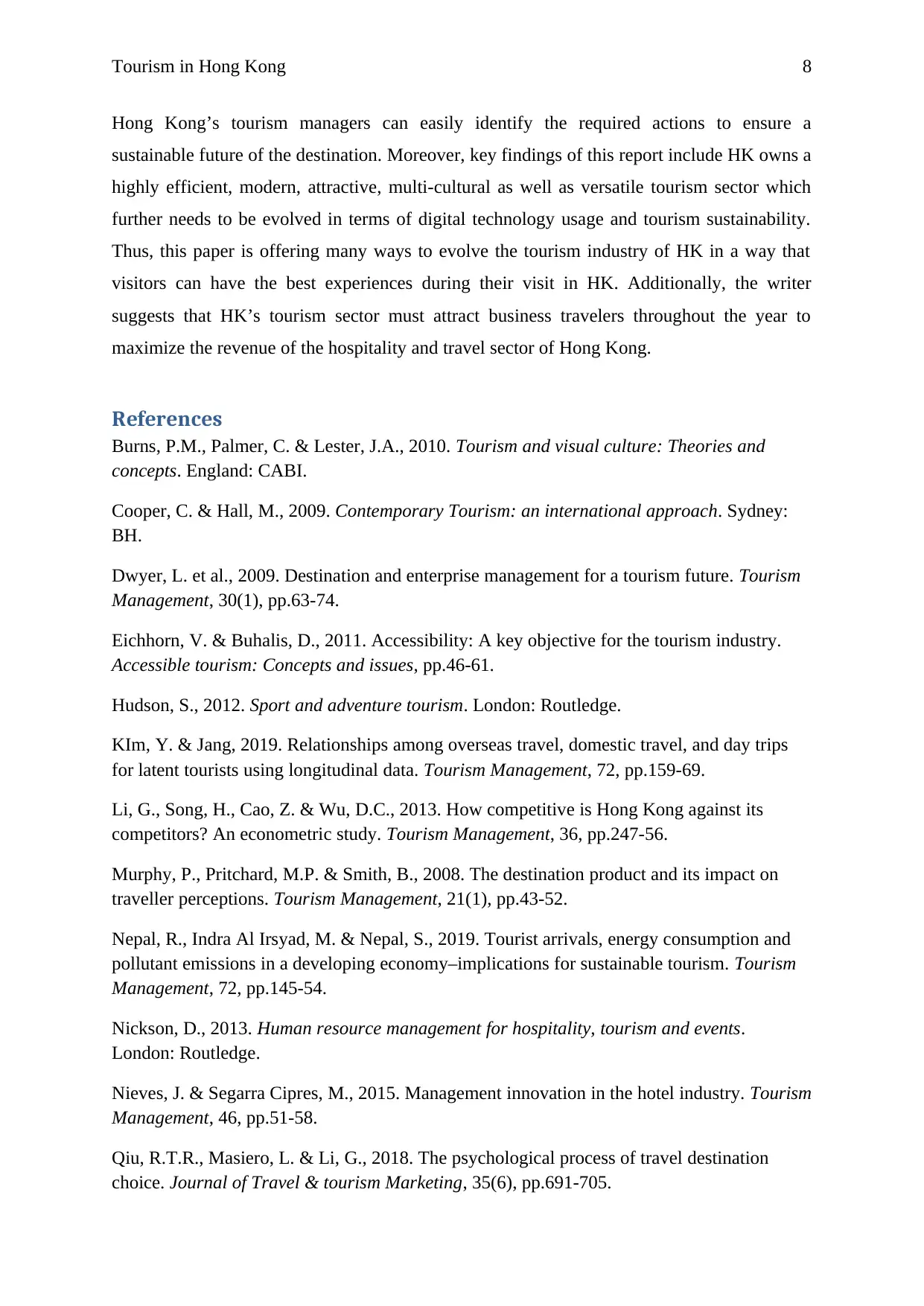
Tourism in Hong Kong 8
Hong Kong’s tourism managers can easily identify the required actions to ensure a
sustainable future of the destination. Moreover, key findings of this report include HK owns a
highly efficient, modern, attractive, multi-cultural as well as versatile tourism sector which
further needs to be evolved in terms of digital technology usage and tourism sustainability.
Thus, this paper is offering many ways to evolve the tourism industry of HK in a way that
visitors can have the best experiences during their visit in HK. Additionally, the writer
suggests that HK’s tourism sector must attract business travelers throughout the year to
maximize the revenue of the hospitality and travel sector of Hong Kong.
References
Burns, P.M., Palmer, C. & Lester, J.A., 2010. Tourism and visual culture: Theories and
concepts. England: CABI.
Cooper, C. & Hall, M., 2009. Contemporary Tourism: an international approach. Sydney:
BH.
Dwyer, L. et al., 2009. Destination and enterprise management for a tourism future. Tourism
Management, 30(1), pp.63-74.
Eichhorn, V. & Buhalis, D., 2011. Accessibility: A key objective for the tourism industry.
Accessible tourism: Concepts and issues, pp.46-61.
Hudson, S., 2012. Sport and adventure tourism. London: Routledge.
KIm, Y. & Jang, 2019. Relationships among overseas travel, domestic travel, and day trips
for latent tourists using longitudinal data. Tourism Management, 72, pp.159-69.
Li, G., Song, H., Cao, Z. & Wu, D.C., 2013. How competitive is Hong Kong against its
competitors? An econometric study. Tourism Management, 36, pp.247-56.
Murphy, P., Pritchard, M.P. & Smith, B., 2008. The destination product and its impact on
traveller perceptions. Tourism Management, 21(1), pp.43-52.
Nepal, R., Indra Al Irsyad, M. & Nepal, S., 2019. Tourist arrivals, energy consumption and
pollutant emissions in a developing economy–implications for sustainable tourism. Tourism
Management, 72, pp.145-54.
Nickson, D., 2013. Human resource management for hospitality, tourism and events.
London: Routledge.
Nieves, J. & Segarra Cipres, M., 2015. Management innovation in the hotel industry. Tourism
Management, 46, pp.51-58.
Qiu, R.T.R., Masiero, L. & Li, G., 2018. The psychological process of travel destination
choice. Journal of Travel & tourism Marketing, 35(6), pp.691-705.
Hong Kong’s tourism managers can easily identify the required actions to ensure a
sustainable future of the destination. Moreover, key findings of this report include HK owns a
highly efficient, modern, attractive, multi-cultural as well as versatile tourism sector which
further needs to be evolved in terms of digital technology usage and tourism sustainability.
Thus, this paper is offering many ways to evolve the tourism industry of HK in a way that
visitors can have the best experiences during their visit in HK. Additionally, the writer
suggests that HK’s tourism sector must attract business travelers throughout the year to
maximize the revenue of the hospitality and travel sector of Hong Kong.
References
Burns, P.M., Palmer, C. & Lester, J.A., 2010. Tourism and visual culture: Theories and
concepts. England: CABI.
Cooper, C. & Hall, M., 2009. Contemporary Tourism: an international approach. Sydney:
BH.
Dwyer, L. et al., 2009. Destination and enterprise management for a tourism future. Tourism
Management, 30(1), pp.63-74.
Eichhorn, V. & Buhalis, D., 2011. Accessibility: A key objective for the tourism industry.
Accessible tourism: Concepts and issues, pp.46-61.
Hudson, S., 2012. Sport and adventure tourism. London: Routledge.
KIm, Y. & Jang, 2019. Relationships among overseas travel, domestic travel, and day trips
for latent tourists using longitudinal data. Tourism Management, 72, pp.159-69.
Li, G., Song, H., Cao, Z. & Wu, D.C., 2013. How competitive is Hong Kong against its
competitors? An econometric study. Tourism Management, 36, pp.247-56.
Murphy, P., Pritchard, M.P. & Smith, B., 2008. The destination product and its impact on
traveller perceptions. Tourism Management, 21(1), pp.43-52.
Nepal, R., Indra Al Irsyad, M. & Nepal, S., 2019. Tourist arrivals, energy consumption and
pollutant emissions in a developing economy–implications for sustainable tourism. Tourism
Management, 72, pp.145-54.
Nickson, D., 2013. Human resource management for hospitality, tourism and events.
London: Routledge.
Nieves, J. & Segarra Cipres, M., 2015. Management innovation in the hotel industry. Tourism
Management, 46, pp.51-58.
Qiu, R.T.R., Masiero, L. & Li, G., 2018. The psychological process of travel destination
choice. Journal of Travel & tourism Marketing, 35(6), pp.691-705.
⊘ This is a preview!⊘
Do you want full access?
Subscribe today to unlock all pages.

Trusted by 1+ million students worldwide
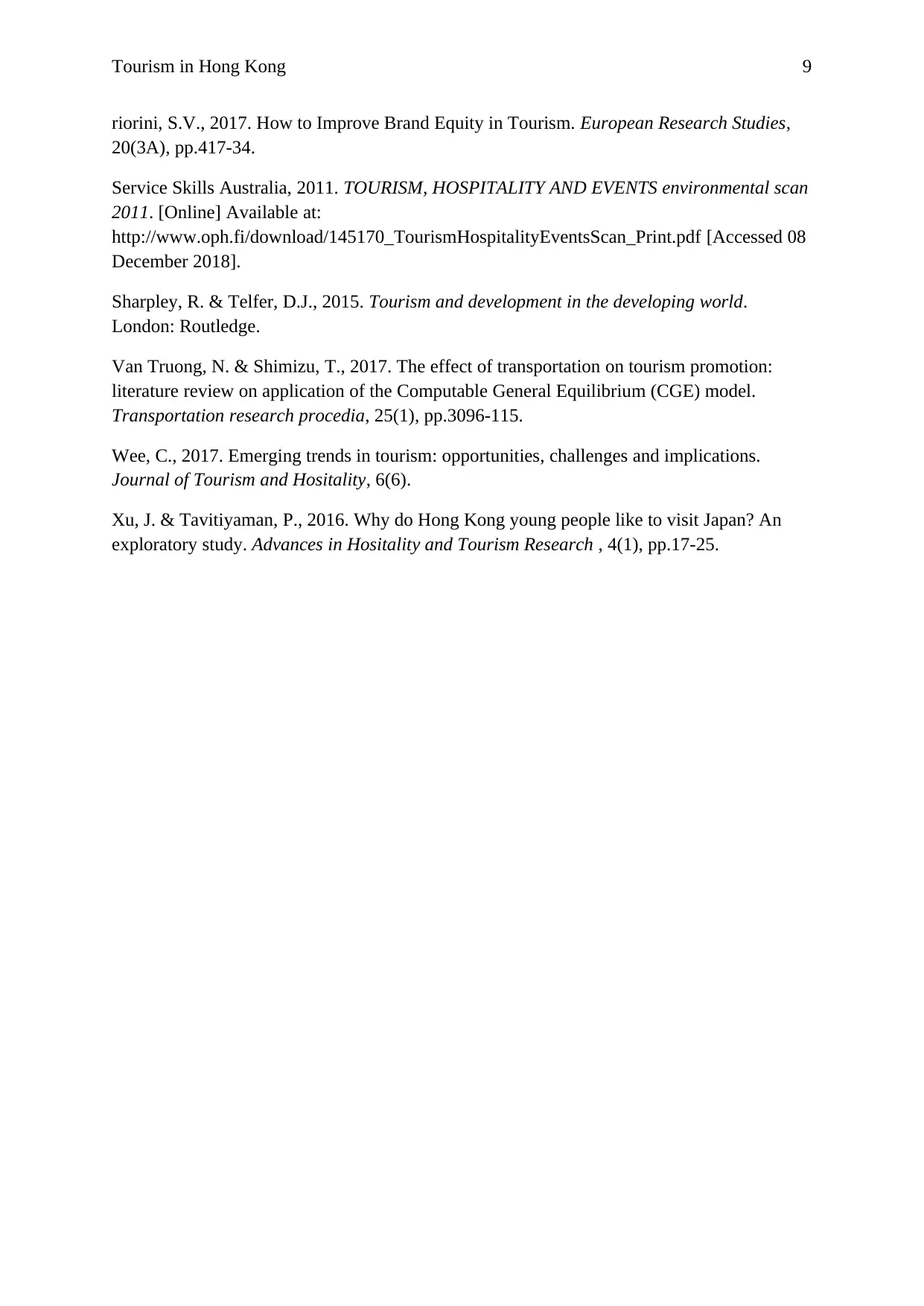
Tourism in Hong Kong 9
riorini, S.V., 2017. How to Improve Brand Equity in Tourism. European Research Studies,
20(3A), pp.417-34.
Service Skills Australia, 2011. TOURISM, HOSPITALITY AND EVENTS environmental scan
2011. [Online] Available at:
http://www.oph.fi/download/145170_TourismHospitalityEventsScan_Print.pdf [Accessed 08
December 2018].
Sharpley, R. & Telfer, D.J., 2015. Tourism and development in the developing world.
London: Routledge.
Van Truong, N. & Shimizu, T., 2017. The effect of transportation on tourism promotion:
literature review on application of the Computable General Equilibrium (CGE) model.
Transportation research procedia, 25(1), pp.3096-115.
Wee, C., 2017. Emerging trends in tourism: opportunities, challenges and implications.
Journal of Tourism and Hositality, 6(6).
Xu, J. & Tavitiyaman, P., 2016. Why do Hong Kong young people like to visit Japan? An
exploratory study. Advances in Hositality and Tourism Research , 4(1), pp.17-25.
riorini, S.V., 2017. How to Improve Brand Equity in Tourism. European Research Studies,
20(3A), pp.417-34.
Service Skills Australia, 2011. TOURISM, HOSPITALITY AND EVENTS environmental scan
2011. [Online] Available at:
http://www.oph.fi/download/145170_TourismHospitalityEventsScan_Print.pdf [Accessed 08
December 2018].
Sharpley, R. & Telfer, D.J., 2015. Tourism and development in the developing world.
London: Routledge.
Van Truong, N. & Shimizu, T., 2017. The effect of transportation on tourism promotion:
literature review on application of the Computable General Equilibrium (CGE) model.
Transportation research procedia, 25(1), pp.3096-115.
Wee, C., 2017. Emerging trends in tourism: opportunities, challenges and implications.
Journal of Tourism and Hositality, 6(6).
Xu, J. & Tavitiyaman, P., 2016. Why do Hong Kong young people like to visit Japan? An
exploratory study. Advances in Hositality and Tourism Research , 4(1), pp.17-25.
1 out of 10
Related Documents
Your All-in-One AI-Powered Toolkit for Academic Success.
+13062052269
info@desklib.com
Available 24*7 on WhatsApp / Email
![[object Object]](/_next/static/media/star-bottom.7253800d.svg)
Unlock your academic potential
Copyright © 2020–2026 A2Z Services. All Rights Reserved. Developed and managed by ZUCOL.




